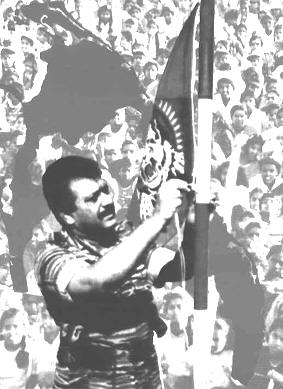 It's time that the Pirabaharan phenomenon be studied
somewhat in depth.
It's time that the Pirabaharan phenomenon be studied
somewhat in depth. His adversaries from India and Sri Lanka have called him
names - a Hitler, a Pol Pot, a megalomaniac and a mass murderer.
The problem
with these self-serving outbursts is that, the 20th century Indian subcontinent
had not seen a leader like him.
In ideals and action, the closest one who can be
identified with Pirabaharan is Subhas Chandra
Bose (1897-1945), though there are noticeable differences in the lives
between both. Thus, the critics of Pirabaharan had groped in the dark to
pigeonhole him into slots with which they are familiar. In this exercise, they
fail miserably because, Pirabaharan is a trend-setter (aligned in the ranks of
Mao Ze Dong) and couldn't be fit into pre-conceived slots.
Thus, the only
reference his critics (which include some prominent Tamils as well) make is to
depict him as a tyrant. Their behavior is like the cry-babies who scream when
what they had in their hands does not work according to their whims.
Nevertheless, a couple of commentators and journalists
who are knowledgeable (like Mervyn de Silva and Anita
Pratap) had identified
Pirabaharan as an unusual brand of leader - in contrast to the tub-thumping
variety of politicians in the Indian subcontinent who are dozen a dime in every
decade. Mervyn de Silva, in selecting Pirabaharan as the 'Man of the Decade' in
1990, wrote,
"As we look back to the 1980s, and study the
decade as a whole, we are inclined to concede primacy to the Tamil threat to
the unity, and indirectly, the sovereignty of Sri Lanka. In that struggle,
there is one commanding personality, the LTTE supremo Velupillai Prabhakaran,
regarded by many western experts as leader of one of the toughest guerrilla
organisations in the world, and by military analysts as a 'genius' in the
theory of unconventional warfare" (Lanka Guardian, Jan.1, 1990).
Eleven years have passed since this assessment was
made. Hitler's rule could last only 12 years. Pol Pot's dictum couldn't fly more
than 4 years. But Pirabaharan had set the political agenda for nearly two
decades now in Sri Lanka and India.
An interesting, thoughtful comment I read in
the internet web page of one Sam Sloane (Ishi Press International, USA)
following the verdict on Rajiv Gandhi assassination trial by the Indian Court is
worth repeating here. Under the caption, 'Who really killed Rajiv Gandhi?',
Sloane had written as follows:
"For nearly two decades, probably more people
have seriously been trying to kill Velupillai Prabhakaran, the leader of the
Liberation Tigers of Tamil Eelam, than any other person in the world. On
Wednesday, an Indian court sentenced Velupillai Prabhakaran to death in
absentia, just for the little thing of killing Rajiv Gandhi. Ha! Ha! Ha!"
The judge in the Indian court came to the ridiculous
conclusion that the only person who wanted Rajiv dead was Prabhakaran, and
therefore he must be guilty, without any evidence linking him to Dhanu. I am
no admirer of Prabhakaran, but I know for a fact that there were 16 million
other Sri Lankans who wanted to kill Rajiv Gandhi, plus a number of Indians as
well..."